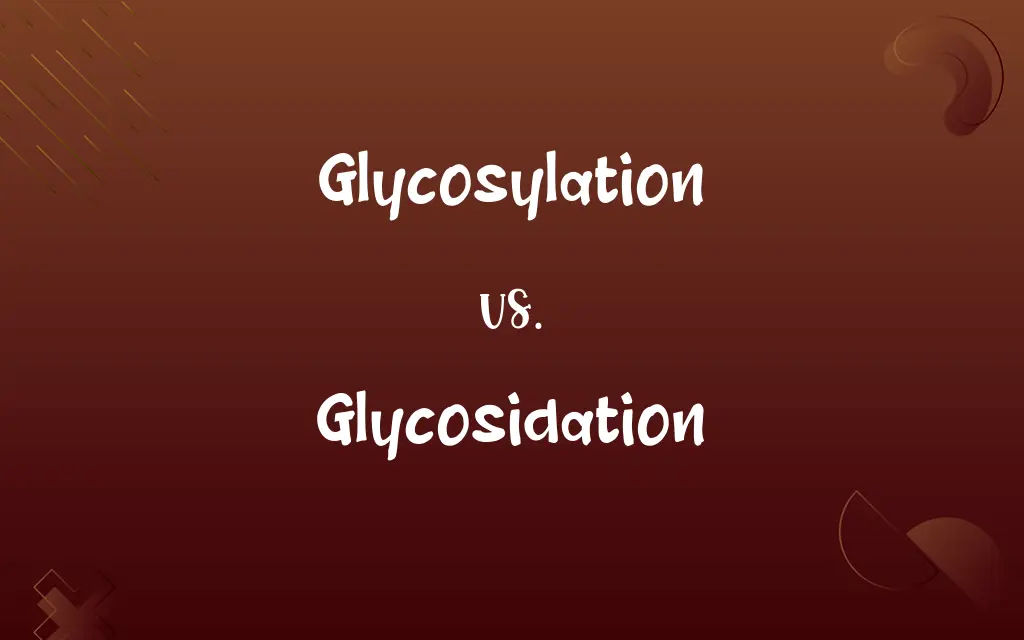Glycosylation vs. Glycosidation: Know the Difference

By Shumaila Saeed || Published on January 4, 2024
Glycosylation is the process of adding sugar molecules to proteins or lipids. Glycosidation is the formation of glycosides, involving the attachment of a sugar to another molecule without nitrogen.

Key Differences
Glycosylation is a biochemical process where sugar molecules are enzymatically attached to proteins or lipids, altering their function and properties. In contrast, Glycosidation refers specifically to the chemical reaction where a sugar molecule is attached to another molecule, typically an alcohol or phenol, to form a glycoside.
Shumaila Saeed
Jan 04, 2024
In biology, Glycosylation is crucial for cell signaling, protein stability, and immune response, involving complex enzymatic processes. On the other hand, Glycosidation is a broader chemical concept, not limited to biological systems, and is significant in synthesizing various organic compounds, including natural products and pharmaceuticals.
Shumaila Saeed
Jan 04, 2024
Glycosylation can occur in different forms, such as N-linked or O-linked, depending on the attachment site on the protein or lipid. Glycosidation, however, is more about the type of chemical bond formed between the sugar and the other molecule, without involving protein or lipid moieties.
Shumaila Saeed
Jan 04, 2024
Glycosylation typically occurs within cells, particularly in the endoplasmic reticulum and Golgi apparatus, as part of protein and lipid synthesis and modification. In contrast, Glycosidation can be performed in vitro in a laboratory setting, used in organic synthesis and the pharmaceutical industry for creating diverse glycoside compounds.
Shumaila Saeed
Jan 04, 2024
While Glycosylation is an enzymatic and highly specific process in biological systems, Glycosidation encompasses a broader range of non-enzymatic chemical reactions, often used in synthetic chemistry for producing various glycoside derivatives.
Shumaila Saeed
Jan 04, 2024
ADVERTISEMENT
Comparison Chart
Definition
Enzymatic addition of sugars to proteins/lipids.
Chemical attachment of sugar to another molecule.
Shumaila Saeed
Jan 04, 2024
Biological Role
Cell signaling, protein stability, immune response.
Not specifically tied to biological processes.
Shumaila Saeed
Jan 04, 2024
Typical Products
Glycoproteins, glycolipids.
Glycosides, including natural and synthetic compounds.
Shumaila Saeed
Jan 04, 2024
Occurrence
In cells, during protein and lipid modification.
In vitro, in organic synthesis and pharmaceutical production.
Shumaila Saeed
Jan 04, 2024
ADVERTISEMENT
Glycosylation and Glycosidation Definitions
Glycosylation
The addition of sugar molecules to biomolecules, altering their properties.
Changes in glycosylation can indicate disease states.
Shumaila Saeed
Dec 28, 2023
Glycosidation
The chemical reaction of attaching a sugar to another molecule.
Glycosidation was used to synthesize the new glycoside compound.
Shumaila Saeed
Dec 28, 2023
Glycosylation
The enzymatic process of attaching sugars to proteins or lipids.
Glycosylation of the antibody improved its stability and efficacy.
Shumaila Saeed
Dec 28, 2023
Glycosidation
A reaction where a sugar molecule is attached to an alcohol or phenol.
Glycosidation altered the solubility of the compound.
Shumaila Saeed
Dec 28, 2023
Glycosylation
A modification of proteins or lipids by adding carbohydrate groups.
The glycosylation pattern of the protein affects its function in cell signaling.
Shumaila Saeed
Dec 28, 2023
ADVERTISEMENT
Glycosidation
The formation of glycosides by bonding sugar to a non-nitrogenous compound.
The glycosidation process is key in creating certain herbal extracts.
Shumaila Saeed
Dec 28, 2023
Glycosylation
A cellular process that attaches sugars to proteins and lipids enzymatically.
Glycosylation is essential for the proper folding of many proteins.
Shumaila Saeed
Dec 28, 2023
Glycosidation
The attachment of sugar molecules to various organic substances.
The laboratory focused on glycosidation reactions for natural product synthesis.
Shumaila Saeed
Dec 28, 2023
Glycosylation
The biochemical process of sugar addition to modify proteins and lipids.
The drug's effectiveness depends on its glycosylation profile.
Shumaila Saeed
Dec 28, 2023
Glycosidation
The process of creating glycosides in organic synthesis.
Glycosidation is a crucial step in producing certain pharmaceuticals.
Shumaila Saeed
Dec 28, 2023
Glycosylation
The addition of saccharides to proteins or lipids to form a glycoprotein or glycolipid.
Shumaila Saeed
Dec 27, 2023
Glycosylation
(organic chemistry) The reaction of a saccharide with a hydroxy or amino functional group to form a glycoside; especially the reaction with a protein or lipid to form a glycoprotein or glycolipid.
Shumaila Saeed
Dec 27, 2023
Repeatedly Asked Queries
What does glycosylation do to proteins?
It modifies proteins, impacting their function and stability.
Shumaila Saeed
Jan 04, 2024
Are enzymes involved in glycosidation?
Typically, no. It's usually a non-enzymatic chemical reaction.
Shumaila Saeed
Jan 04, 2024
What are glycosides, in relation to glycosidation?
Glycosides are compounds formed by attaching a sugar to another molecule through glycosidation.
Shumaila Saeed
Jan 04, 2024
Does glycosylation only occur in humans?
No, it's a common biochemical process in many living organisms.
Shumaila Saeed
Jan 04, 2024
What types of molecules can undergo glycosidation?
Alcohols, phenols, and various organic compounds.
Shumaila Saeed
Jan 04, 2024
Do all proteins undergo glycosylation?
No, only specific proteins are targeted for glycosylation.
Shumaila Saeed
Jan 04, 2024
How does glycosylation affect cell communication?
It plays a key role in cell signaling and recognition processes.
Shumaila Saeed
Jan 04, 2024
Can glycosidation occur in living organisms?
While it's mainly a laboratory process, similar reactions can occur in nature.
Shumaila Saeed
Jan 04, 2024
Is glycosidation a common reaction in food chemistry?
It can be used in producing certain food additives and flavors.
Shumaila Saeed
Jan 04, 2024
Are there health risks associated with glycosidation?
In some cases, especially if the resulting glycosides are toxic.
Shumaila Saeed
Jan 04, 2024
Are all glycosides the result of glycosidation?
Yes, glycosides are typically formed through glycosidation.
Shumaila Saeed
Jan 04, 2024
Can glycosidation be used to enhance drug properties?
Yes, it can improve solubility, stability, and efficacy of drugs.
Shumaila Saeed
Jan 04, 2024
What's the significance of glycosylation in diseases?
Abnormal glycosylation patterns can be indicators or contributors to diseases.
Shumaila Saeed
Jan 04, 2024
What is the main difference in application between glycosylation and glycosidation?
Glycosylation is key in biological processes, while glycosidation is important in chemical synthesis.
Shumaila Saeed
Jan 04, 2024
Can glycosylation be studied in real-time?
Advanced techniques allow for real-time study of glycosylation in biological systems.
Shumaila Saeed
Jan 04, 2024
What are the environmental impacts of glycosidation?
It depends on the specific chemicals and processes used in the reaction.
Shumaila Saeed
Jan 04, 2024
Can glycosylation be engineered for specific purposes?
Yes, through biotechnology, specific glycosylation patterns can be designed.
Shumaila Saeed
Jan 04, 2024
How does glycosylation affect a protein's location in a cell?
It can dictate protein trafficking and localization within the cell.
Shumaila Saeed
Jan 04, 2024
Can glycosylation be used in biomarker discovery?
Yes, changes in glycosylation patterns can serve as disease biomarkers.
Shumaila Saeed
Jan 04, 2024
Share this page
Link for your blog / website
HTML
Link to share via messenger
About Author
Written by
Shumaila SaeedShumaila Saeed, an expert content creator with 6 years of experience, specializes in distilling complex topics into easily digestible comparisons, shining a light on the nuances that both inform and educate readers with clarity and accuracy.








































































